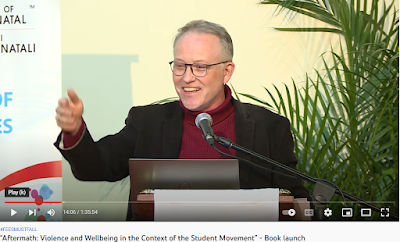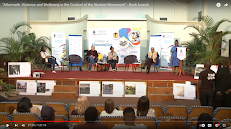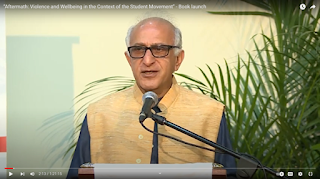
It was a week of great activity at the University of KwaZulu-Natal (UKZN) from 22 to 26 August 2022. Upon the invitation of the Humanities Institute and hosted by the Centre for Create Arts, the HSRC-Univen team of researchers studying the wellbeing and violence in relation to the student movement presented the "Aftermath" exhibition. The exhibition was kindly opened by DVC: Humanities, Prof Nhlanhla Mkhize of UKZN.
It turned out to be a great success. The exhibition was shown on two days in the Shepstone Building and for its opening, we put it up in the Howard College building. On Monday 22 August, Prof Saleem Badat hosted the book launch of #FeesMustFall and its Aftermath: Violence, Wellbeing and the Student Movement in South Africa published by the HSRC Press (2022). The pictures here are from the book launch. It was very engaging. Prof Lebo Moletsane did a beautiful job in her critical appraisal of the book (which we call a 'coffee table book' and she urges us to call a 'visual essay'). The staff and student audience askes good questions and raised critical issues. I enjoyed doing a reading of the book, I actually literally read most of "Chapter 1: Student wellbeing, to us" to the audience. It is the chapter where we position ourselves and our research with the activists in terms of our commitments and understandings.
I was glad to find a number of familiar faces among the audience, including the UWC political scientist Lindokuhle Mandyoli. His work in the UWC #FeesWillFall protests, analysing and interpreting it through the lens of Antonio Gramsci's work on hegemony is giving amazing insights. He asked the question, what the role of civil society is in supporting student movements.
 The next day we found ourselves in the same space again, debating the future of the student movement and its impact on higher education at the colloquium organised by the Humanities Institute and Prof Saleem Badat as part of the HSRC event series coming to UKZN. During that time, the exhibition was visited by numerous students and staff members. The colloquium continued until late into the afternoon. Among the presenters were also two freshly baked PhDs from Cambridge, Drs Anye Nyamnjoh and Josh Platzky Miller.
The next day we found ourselves in the same space again, debating the future of the student movement and its impact on higher education at the colloquium organised by the Humanities Institute and Prof Saleem Badat as part of the HSRC event series coming to UKZN. During that time, the exhibition was visited by numerous students and staff members. The colloquium continued until late into the afternoon. Among the presenters were also two freshly baked PhDs from Cambridge, Drs Anye Nyamnjoh and Josh Platzky Miller. It was an amazing workshop which started with a session where the UKZN colleagues openly shared their experiences of #FeesMustFall and its aftermath. It was heartbreaking to hear that several of them said that they had NEVER had the chance to actually reflect in the collective of their colleagues on these experiences, which in many cases left their psychological traces. Among the few students who joined the sessions (or must I say gate-crushed :), there was one who mentioned after the first session that this was the first time that he felt the university had a human face. In all his years as a student and activist on campus, he never felt that university staff members cared at all for student wellbeing. It moved Keamo to tears!
Following the first session, we workshopped in small groups the fresh off the press 'student affairs manual' called Restoring Wellbeing after Student Protests: Lessons from #FeesMustFall (HSRC, 2020) which turned out to be a catalyst for difficult conversations.
 Overall, the workshop was designed as a safe space and our colleagues from across UKZN counselling, governance and student leadership development were very appreciative of us. We in turn were just so grateful to have been invited into their space and been given the opportunity to work with them. which turned out to be an amazing collective learning experience for all of us.
Overall, the workshop was designed as a safe space and our colleagues from across UKZN counselling, governance and student leadership development were very appreciative of us. We in turn were just so grateful to have been invited into their space and been given the opportunity to work with them. which turned out to be an amazing collective learning experience for all of us. I am incredibly grateful to Dr Keamo Morwe who is my co-principal investigator on the violence and wellbeing project. She has such a beautiful soul, full of energy (never mind her saying "I am tired!", just saying) and a well-trained, sharp mind. I am grateful to Dr Angelina Wilson-Fadiji, who has contributed so much in terms of all her knowledge and research on wellbeing in African educational contexts. Sphelele Khumalo and Thalente Hadebe from the UWC and DUT student groups of photovoice researchers have participated throughout the UKZN events. They have reminded me why I am doing this with their appreciation, commitment, and hope. Together we are pushing the boundaries, advocating for substantive access; access that leads to success where a student can develop the capabilities to achieve their aspirations. I am grateful to Prof Saleem Badat who continues to strike me for his beautiful, razor sharp, critical mind; his ability to cut through a flood of words and pick out that point that was so difficult to articulate. What a privilege to spend a day in his company.





